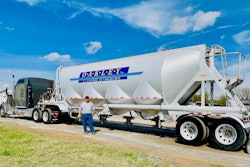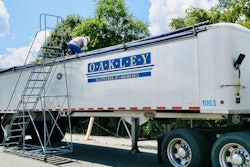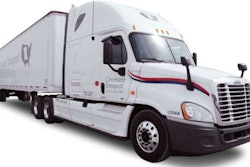 Several flatbed companies have announced driver pay increases so far in 2018.
Several flatbed companies have announced driver pay increases so far in 2018.Flatbed pay has been trending upward for months with no signs of slowing down. If you’re a driver looking for better pay then you may be asking yourself, “Should I get into flatbedding?”
In 2017, American Truck Business Services’ (ATBS) flatbed clients brought in an average net income of $70,477, which was over $10,000 above the firm’s 2017 average for all its thousands of owner-operator clients, reported Overdrive Editorial Director Max Heine.
Overdrive Senior Editor Todd Dills reported in May that flatbed volumes were hot across the country, with volumes up another 10 percent. In April the national average rate was a record high of $2.65 per mile.
On the company driver side, several flatbed fleets have announced pay increases for their drivers this year. Arlington, Washington-based carrier Smokey Point Distributing, a Daseke company, announced in May that it would be paying qualified solo over-the-road drivers with flatbed hauling experience an annual salary of $65,000 and each experienced member of a driving team a $75,000 annual salary starting June 1.
Melton Truck Lines, a flatbed carrier based in Tulsa, Oklahoma, in March raised company driver pay by 2 CPM and increased tarp pay to $50. Also in March, Birmingham, Alabama-based flatbed carrier Montgomery Transport gave its drivers a 1 CPM raise. According to the fleet, that raise brought its drivers’ average annual pay to more than $62,000.
 Boyd Bros. Transportation gave its drivers a 2 CPM raise in February with a $1,000 weekly minimum pay.
Boyd Bros. Transportation gave its drivers a 2 CPM raise in February with a $1,000 weekly minimum pay.Boyd Bros. Transportation, another Daseke flatbed fleet based in Birmingham, also gave its drivers a 2 CPM raise in February with a $1,000 weekly minimum pay. Memphis, Tennessee-based flatbed fleet Builders Transportation Co. raised driver pay to 55 CPM for flatbed drivers with two years of recent experience. The fleet’s seniority program allows drivers to boost pay to 60 CPM.
Rick Williams, CEO of Daseke fleet Central Oregon Truck Company, said flatbedders are very much in demand right now.
“We have a very, very high demand right now. I would say in the flatbed industry there’s currently about an average of a 10 percent unseated rate across fleets. We’re looking very hard,” Williams said.
Williams expects shipper demand to continue for the next 8-24 months.
FLATBEDDING SKILLS
All financial indicators say that now’s a good time to be a flatbedder, but it’s not necessarily easy to switch over to flatbed from dry van, reefer, or other types of hauling that have fewer physical requirements. Flatbed is more physically involved and often requires specialized tarping skills, as well as additional skills depending on if you’re going to be hauling oversized freight.
Owner-operator Bryan Smith, who was a candidate for Overdrive’s Owner-Operator of the Year, says you have to be more physically capable in order to haul flatbed.
“When you compare it to something like dry van, you have to do pretty much everything that a dry van would have to do plus you have load securement, plus you have to keep things dry. They can’t get rained on or something. You have to worry about all these added issues,” Smith said. “It is more physically demanding for sure. Especially if you’re going to throw chains around, throw tarps around.”
Drivers who haul flatbed have to care for their cargo in a different manner, Williams said, citing how drivers are responsible for the correct securement of their cargo.
“Flatbedding is more of an art. It takes a higher degree of professionalism. There is more pay to it. I think it’s a more prestigious role as a driving team member. They’re going to see more variety in their day to day loads,” Williams said.
 Bryan Smith
Bryan SmithFlatbedders also have to face off with the weather more than other drivers. Whether it’s raining, windy, or snowing, the load still has to be secured and tarped. On windy days, for example, you might be trying to throw straps and having the wind throw them back at you, or the wind may catch your tarp like a parachute.
“Flatbed, in comparison to some, you’re going to get a lot dirtier. It’s dirty work and you have to be dressed for the weather. You have to know that you’re going to be out there in the summertime. You’re going to be sweating. And in the winter you’ve got to get out there even if it’s below zero out there. You have to dress for the weather during the wintertime,” Smith said.
FUTURE OF FLATBEDDING
Technology is shaping the future of flatbedding in much the same way it is for the trucking industry as a whole.
“There’s tons and tons of technology. For years trucking lagged in technology so there’s a real boom for trucking to catch up. I think overall we’re doing a very good job as an industry,” Williams said.
Specifically, in flatbed, Williams expects to see more roll top or curtain van type configurations just to improve the safety of a driver being on top of a load. These systems also reduce the time it takes to tarp a load.
In terms of tractor-trailer aerodynamics, Smith expects there to be limited improvements.
“I don’t see that there’s going to be a lot that you can do with aerodynamics, like with other types of trailers. The tractor might get more aerodynamic,” Smith said. “The trailers, I don’t know if you can really do a whole lot with them. You’re always going to get a little bit worse fuel mileage just because of the air drag and things, and depending on what you put on the trailer. You can’t make everything fly through the wind.”
No matter what the future holds in terms of technological advancements, flatbedding will always be there, Smith said. There will always be things that you just can’t put into other kinds of trailers.
“A lot of people aren’t going to want to do that extra work so if you’re willing and able to do the work, I think you’ll always be busy in my opinion,” Smith said.










